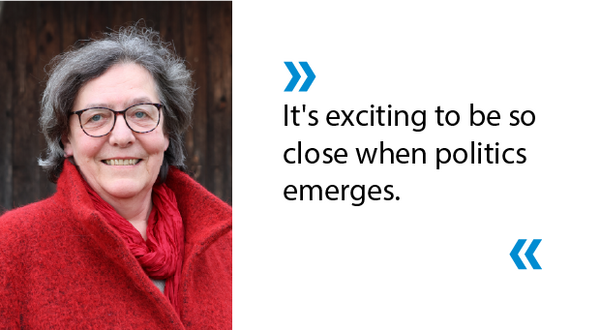Petra Raue
From development cooperation in Mozambique to funding policy in Germany.

Research for the pure gain of knowledge? That would not be sufficient for Petra Raue. She wants to initiate change with her work. Being close when politics is created, the exchange with the people in the ministries and on site – that is what she appreciates as a scientist.
Petra Raue's path to research was not programmed, because she grew up as a working-class child in the Ruhr area. "Why do you want to study? You're getting married anyway." She often heard such sentences. And yet – despite discouragement and a lack of role models, she chose her own way: After starting her first career as a pharmaceutical-technical assistant and graduating from high school on the second educational path, she studied agriculture. Her dream was to work in development cooperation. The birth of her daughter during her studies and her role as a single parent did not prevent her from achieving her goal: And so, her first station as a graduate engineer in agriculture was a management position for a project in Mozambique. There she supported local farmers in organising irrigation, vegetable cultivation and erosion control.
Concerns about her daughter's school career finally led her back to Germany. At the Thünen Institute (back then the Federal Research Centre for Agriculture), Petra Raue found a new field of expertise. For meanwhile 25 years, she has been evaluating the impact of rural support programmes together with other scientists. They analyse whether the programs work as intended and how they can be improved.
In the meantime, she has set a special focus: gender equality. "How can funding policies be designed in such a way that they take into account the interests of women and men on an equal footing?" is a central question of her work. At the same time, she knows from her research that there is still a long way to go before equality is achieved. "Even today, men in decision-making bodies often do not have an eye for the situation of women. That's why their issues are insufficiently incorporated into politics," she says. If there were one change that her research is still supposed to bring about, it would be a quota for equal representation in decision-making bodies in rural areas. This is necessary so that the different perspectives are included. The scientist is convinced of this.
What does Petra Raue wish for women in science? She thinks flexibility is important and less rigid working time regulations so that research and family go well together. And fathers should be supported in taking more than two months of parental leave. Above all, however, she wishes for more space for women. Women should occupy spaces with the same naturalness as men – and their assertiveness should be valued by society just as much as that of men.





